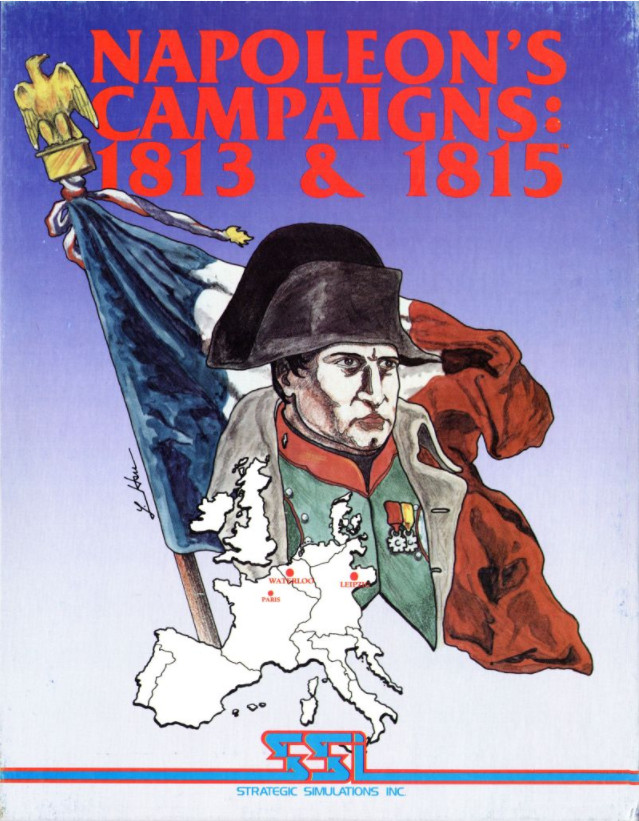
Emperor! We received a dispatch from Maréchal Marmont. He is in contact with the enemy. He is deploying his Corps and waiting for further instructions.
Excellent, Lieutenant! How many enemies, and where are they exactly?
This he does not know. The Maréchal does not actually see the enemy, that’s just his extra-sensorial power telling him the enemy is somewhere next to him and that he ought to deploy.
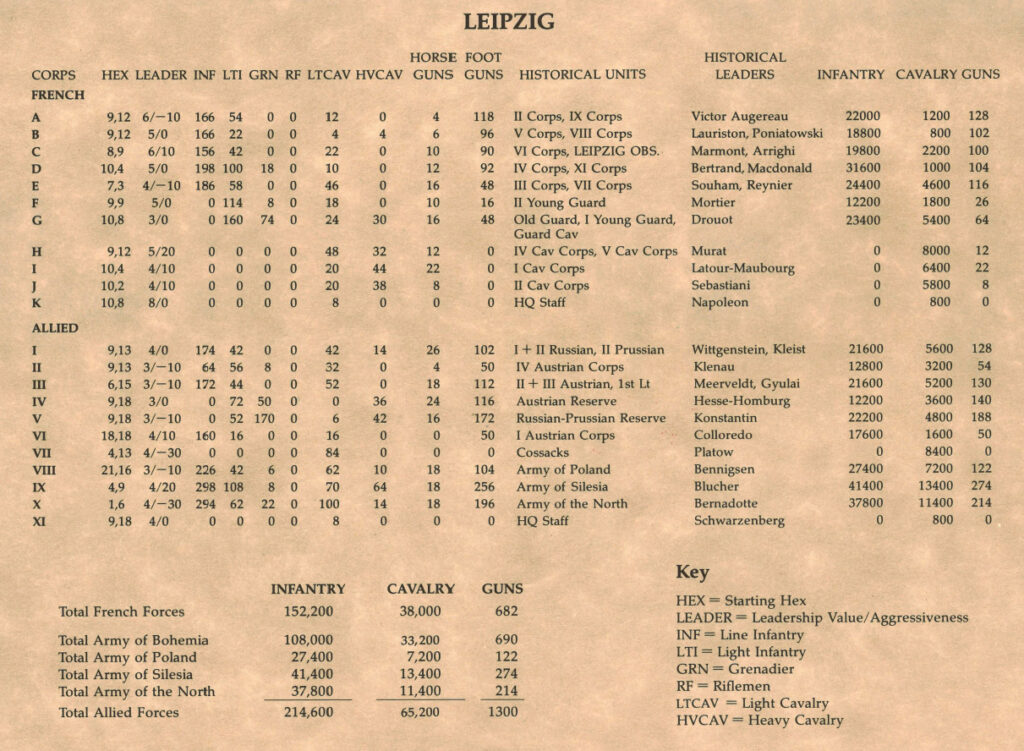
Napoleon’s Campaigns: 1813 & 1815 is SSI’s last game published in 1981 and their first game at operational scale. It is also their first game with delayed order and information, though Broderbund had already introduced such gameplay – poorly – in Tawala’s Last Redoubt.
The game features two battles: the 1815 Battle of Waterloo which needs no introduction (it was already covered, in a very different way, by Computer Napoleonics in 1980) and the 1813 Battle of Leipzig. I already wargamed Waterloo, so Leipzig it is !
The Battle of Leipzig is a turning point in the War of the Sixth Coalition. In 1812, Napoléon had retreated from Russia and lost half his army, true, but the following year he had managed to rebuild his army and now it was Russia’s turn to come on the territory of the French Empire. Unfortunately for Napoléon, Germany was not as firmly under his control as he expected, and several of his “allies” switched side : Prussia first, then Sweden, finally Austria. The Coalition avoided directly confronting Napoléon, focusing their efforts everywhere he was not and defeating Napoléon’s Maréchaux. Overwhelmed, the French were slowly pushed back.
Napoléon decided to force a decisive battle by concentrating his troops in a central position. If that meant fighting the Coalition at 1:2 ratio, Napoléon was ready, certainly he could defeat his poorly coordinated enemies in detail. The central position would be Leipzig. The Battle of Leipzig, also called the Battle of Nations,was possibly the largest and bloodiest battle in history until the opening battles of the first World War.
I will be playing no less than Napoléon himself – there is no other option in Solitaire.
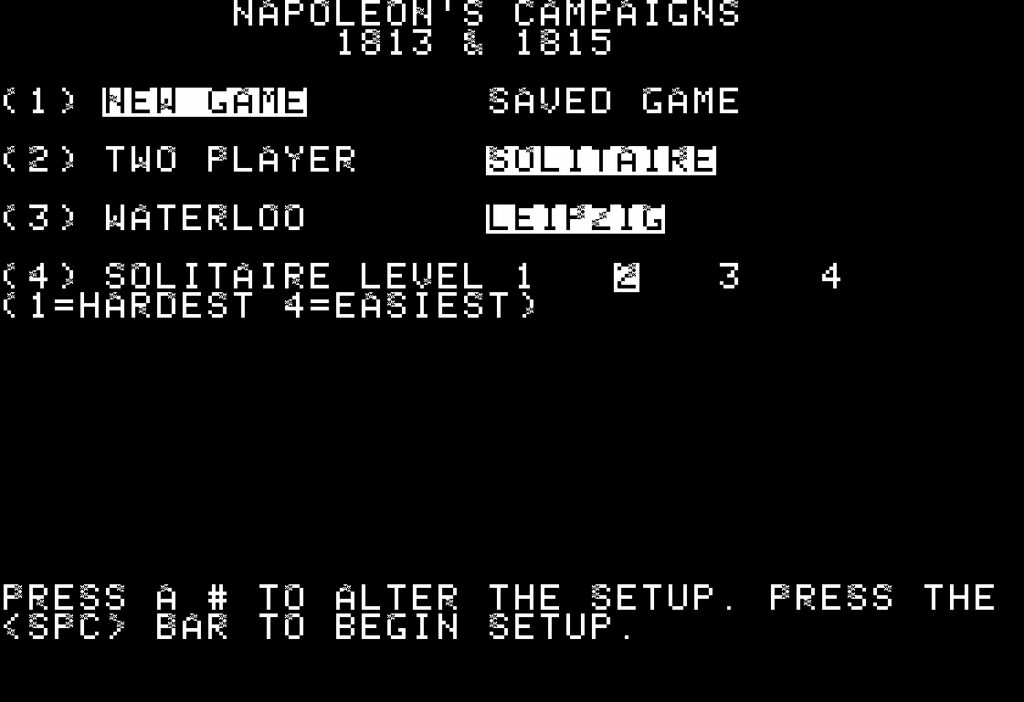
14th of October 1813
Here is the situation on the 14th of October 1813. Below is a snapshot of the physical board with me adding the units in an image editor by hand.
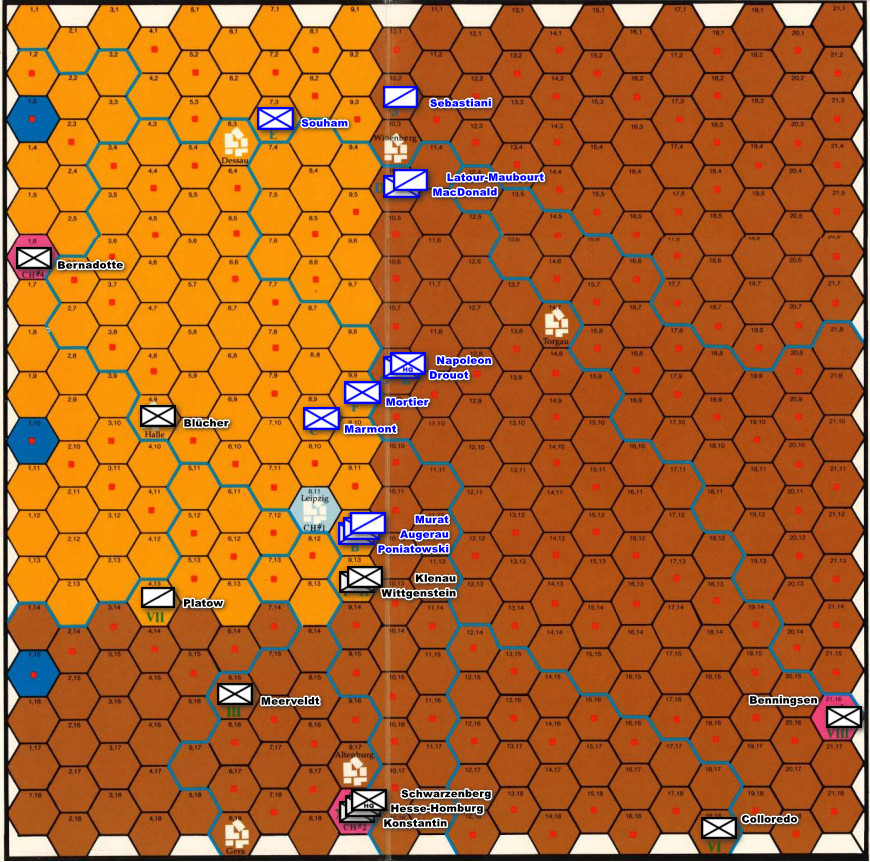
While there is the same number of corps for both sides (11), all corps are not equal and the French are outnumbered and outgunned. Their one advantage, though, is that they are concentrated, whereas the Coalition forces are all over the place – it will for instance take several days for Benningsen’s and Colloredo’s Corps to join the fun.
The French objectives for the scenario are
- control Leipzig,
- open a “communication route” to the West (historically, Napoléon narrowly avoided encirclement),
- and of course, the French get extra points for any losses caused to the coalition.
As for my plan, nothing very original. Blücher’s Army of Silesia is blocking my access to the West but he is also isolated. I will concentrate my forces to destroy his army first, leaving only picket forces North and South. More specifically :
- Augereau will occupy and guard Leipzig,
- Poniatowski will occupy the crossroad South-West of Leipzig to prevent any reinforcement from reaching Blücher,
- Souham will stop Bernadotte from escaping North, so I can destroy that traitor next,
- Everyone else will surround Blücher in Halle and destroy his army!
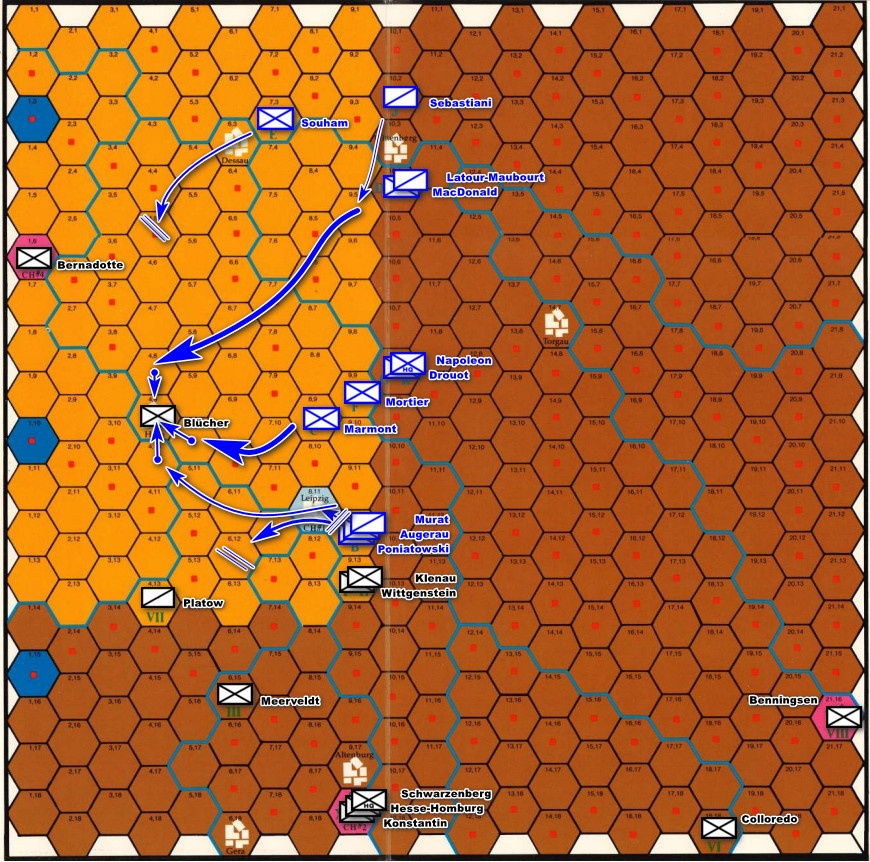
Before I can put my plan in motion though, the game asks me to give each corps a level of urgency and a contact mode. In Napoleon’s Campaigns, you don’t have full control of your corps. Instead, you give them instructions and contact mode (“Rule of engagement“) through dispatches, and then the commanders do what they can do, or what they want to do.
Urgency is a combination of how much the generals must push their soldiers (eg force march, or not) and how aggressive they must be in battle,
Contact Mode is what a general should do upon meeting the enemy, between :
- Withdraw (force march away from the enemy),
- Stand (hold position, do not attack),
- Attack,
- Hasty attack (immediately attack, but with a handicap)
- Initiative: “do what is most appropriate in your view“
I want to move fast, so all my armies are given maximum urgency (9) and Initiative contact mode except Augerau who is given minimum urgency and Stand contact mode: if he is attacked in Leipzig I want him to make sure the battle lasts as long as possible so reinforcements can be brought in.
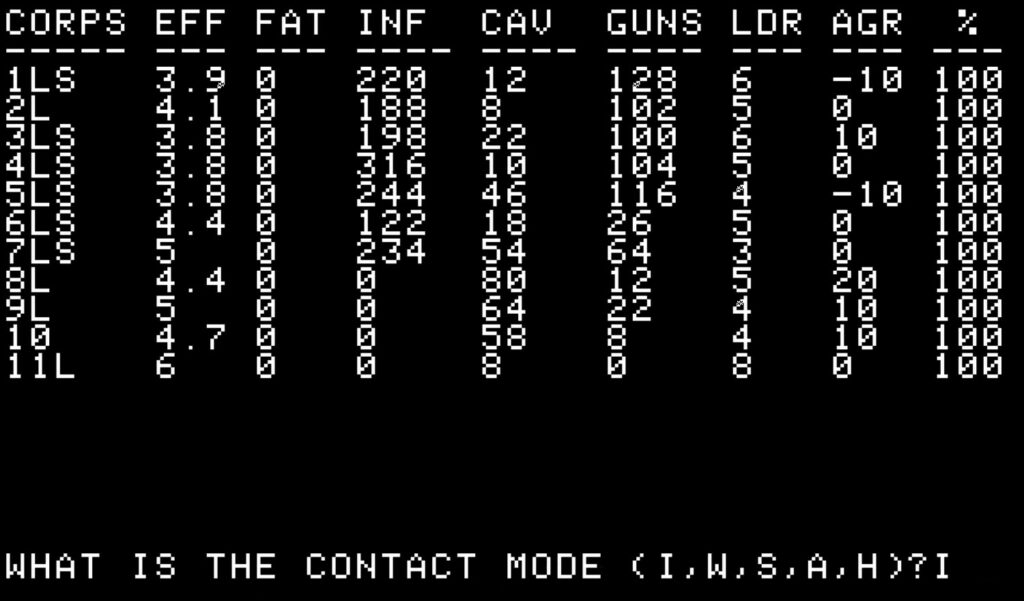
Finally, the game asks me to plot the communication line, which needs for now to emanate from Leipzig and follow the roads. Given my plan, there are not a lot of options :
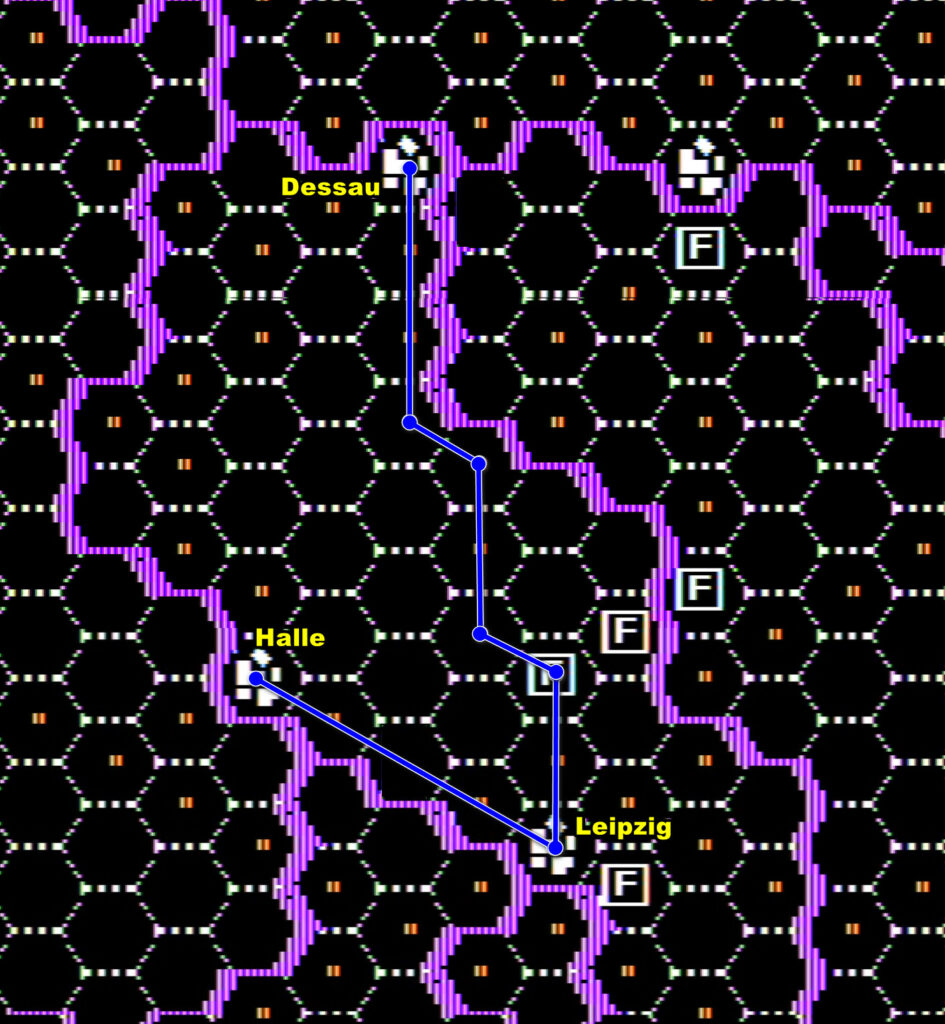
And with this, the operation starts. I send dispatches to all my forces – Sebastiani and Souham are so far away that it will take a few hours before they receive the dispatches and start moving, and conversely I will receive news from them, including their locations, 4 hours (1 turn) late.
The rest of the day is uneventful, my men are marching.
15th of October 1813
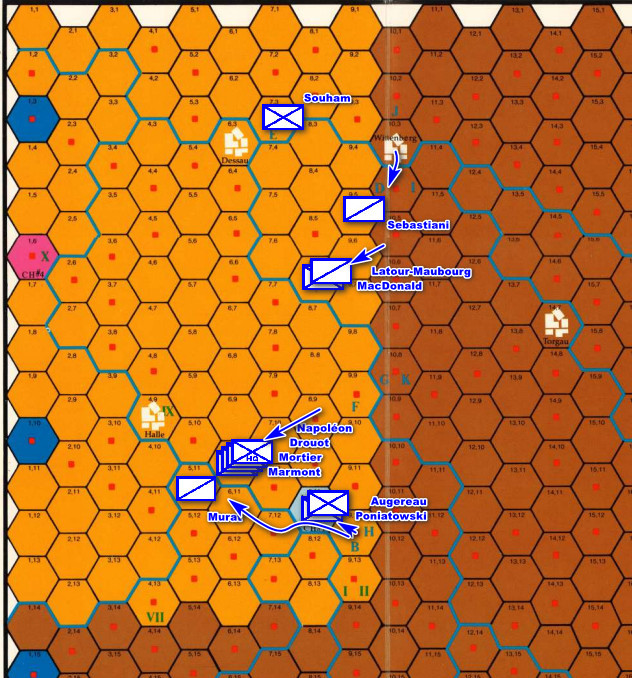
On the morning of the 15th, not all of my troops were where I expected them to be.
Souham did not move. I either made a mistake in sending him my orders, or he never received my dispatch, in any case,e I resend him his orders.
As for Poniatowski, he is still in Leipzig for some reason. This is where I must start describing the first of several issues ruining this game: you have no way of knowing where the enemy is, even when you are literally in its zone of control. The only information you receive (and I did quite a few tests with cavalry ) is semi-random sightings like this below, and even then not necessarily in hexagons next to your forces. [Edit: 29/01/2025 I found years later a fix to this issue, see at the bottom of this article]

Sometimes, the “activity” is your own units (very useful, thank you for the memo !), but if it is not, then it has to be the enemy, except in those rare cases where the report is a fluke.
All other information on enemy activity, you must obtain by indirect means: typically if your general tells you he is preparing to stand/attack, it means that there are enemy forces in a neighbouring hexagon, but frustratingly your general will not tell you where exactly
… and even this method is not always reliable. If your general has the Initiative contact mode, then he will not tell you anything – ever!
I order Augerau and Poniatowski to transition to Stand contact mode and lo and behold, they now tell me they are “standing”, so the reason for which Poniatowski was not moving was that there was at least one enemy corps next to him somewhere, but he was too proud to tell me. And of course, I have no idea where said corps is.
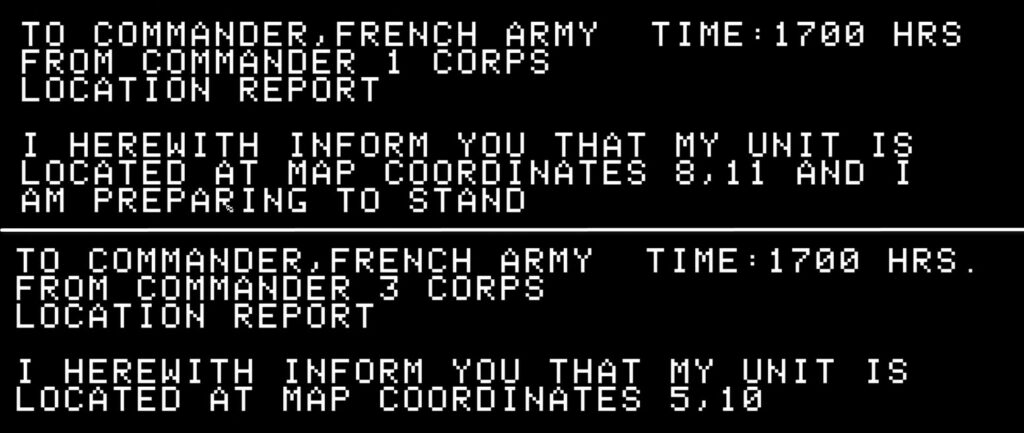
Well, I can leave Poniatowski in Leipzig – too late to cut reinforcements for Blücher. In any case, Murat moved very fast and did not report any hostile activity.
16th of October 1813,
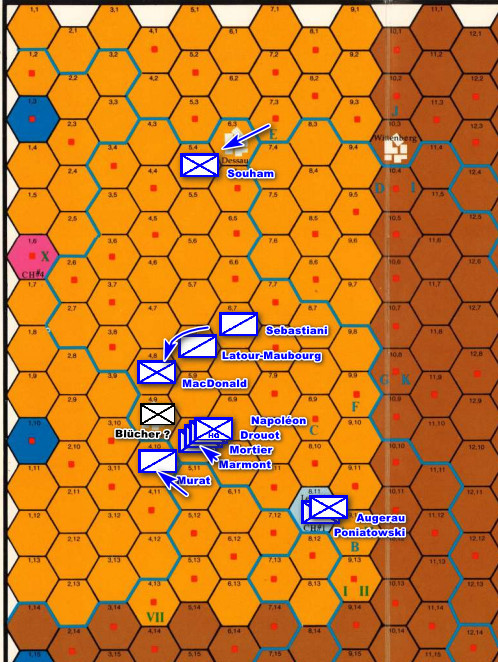
I am now fully surrounding Halle. By chance, a report confirmed there was still some “activity” in the city, and it can be no one else than Blücher. Theoretically, it could be Blücher and someone else, of course. Let’s hope not!
I wait for Latour-Maubourg, and transition everyone to attack contact mode. At 1 PM, the battle of Halle starts :

Napoléon is part of this battle, so I can change the urgency (bloodiness of the battle) on the fly. I choose the maximum possible level – all-out assault. I want Blücher destroyed as soon as possible.
With Napoléon directly leading his corps, I also get to choose how much I commit each corps. I made the mistake of overcommitting the 4th corps (MacDonald) even though it had been tired by a forced march cross-country.
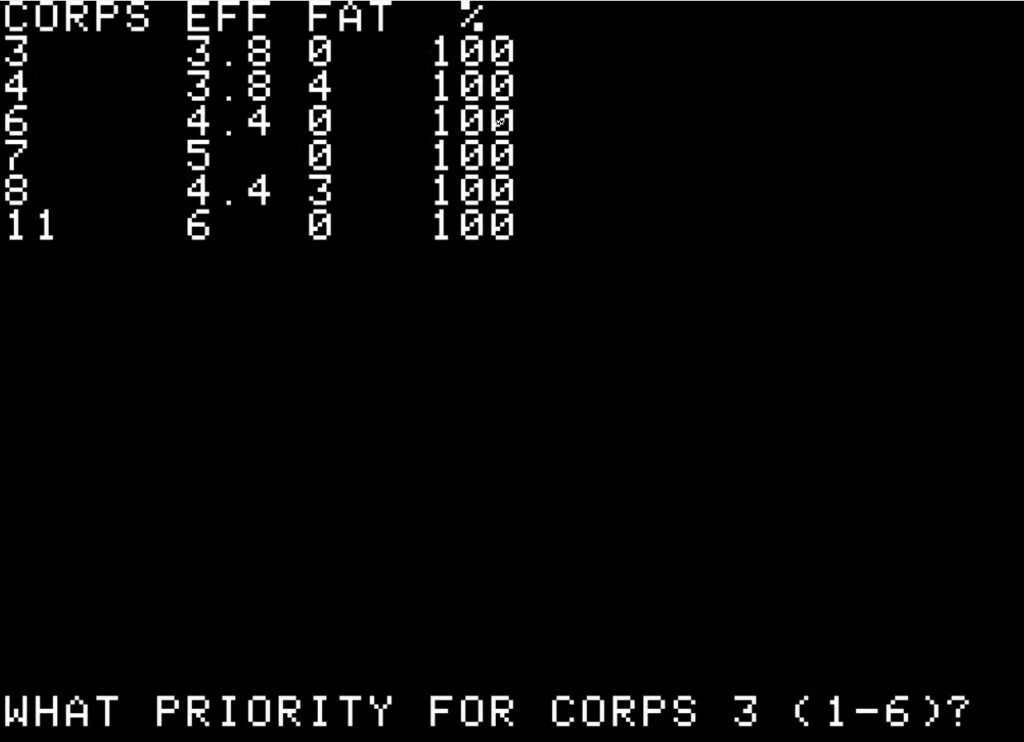
In any case, I bring more than 100 000 men against Blücher’s 56 000, so whatever defensive advantage the Prussians have is not going to help them. I cause devastating losses :
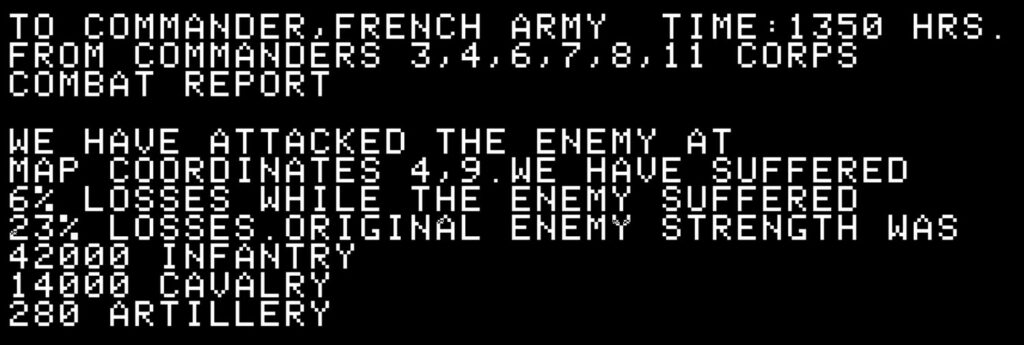
Unfortunately, the battle is too much heat for MacDonald’s Corps, and he is now fleeing North. Hopefully, he won’t run into Bernadotte !

As I attacked Blücher from all directions, he cannot retreat, and I can force another battle a few hours later :

MacDonald having routed, he is not locking the Northern retreat route any more, so in theory Blücher could have fled North, but neither Latour-Maubourg nor Sebastiani are reporting “preparing” to anything in their dispatches, which means there is no enemy next to them. I must assume that Blücher’s corps has been fully eliminated. Apparently, a whole enemy corps of some 35000 surviving men surrendering was not important enough for anyone to send me a dedicated dispatch.
I check the status of my forces after this first decisive engagement :
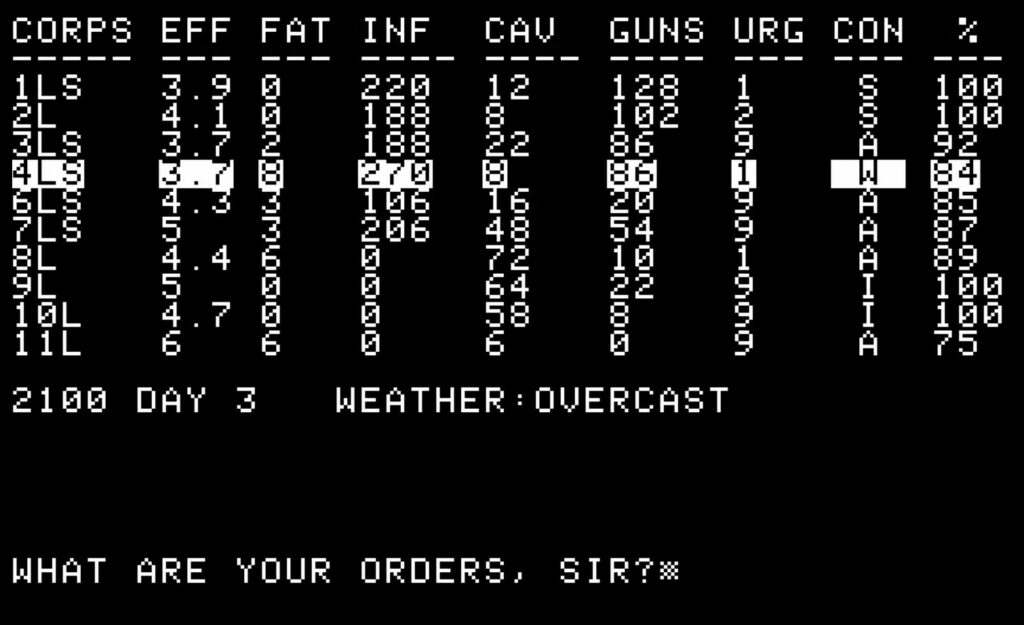
MacDonald is still routing and impossible to rally for now, but the rest looks good: I destroyed 20% of the coalition, with maybe 8% or 10% of my own total forces gone at worst.
17th of October 1813
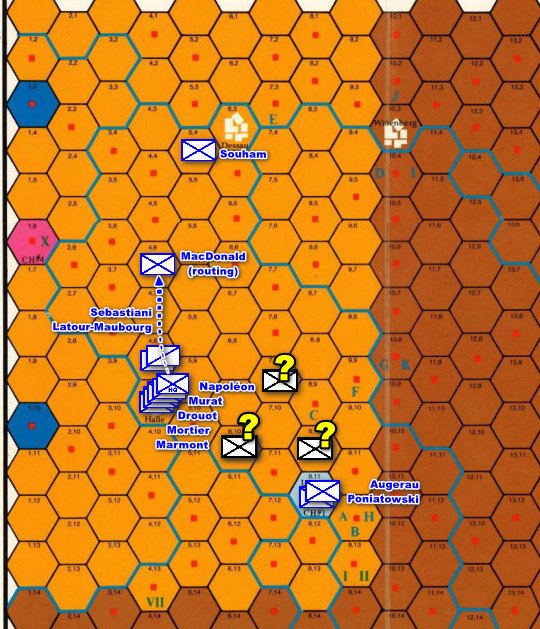
During the night and early morning, I received several reports about enemy forces. Possibly, some of these reports were flukes, or the same enemy units moving, but unlikely. In any case, Augerau and Poniatowski keep telling me they are ready to stand. To stand against what? I don’t know.
That one army between Halle and Leipzig could have cut my communication route to Halle, except that at 5AM I had changed it and made it flow from the West, so actually it is Leipzig that is now out of the loop. I don’t care much: being on the communication route helps with fatigue, and neither Augerau nor Poniatowski are doing anything strenuous.
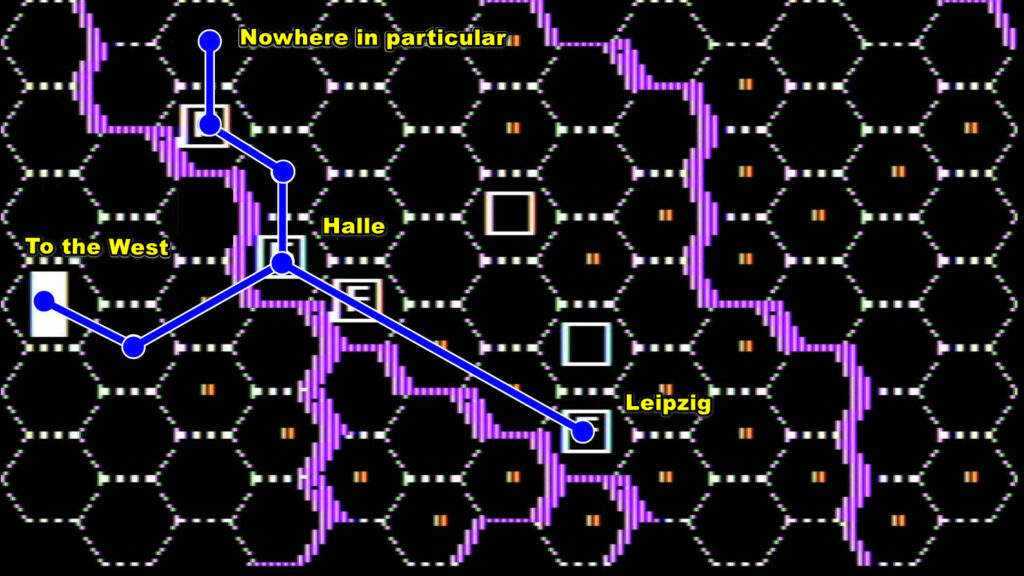
I plan to reopen the road to Leipzig, but heavy rain thwarts my plans. My troops are exhausted from the battle of the previous day, and even limited movement in the rain demoralizes them [in game terms, what actually happens is that in the rain their movements are much slower, and so they are still moving during night turns, and moving during the night is devastating for fatigue].
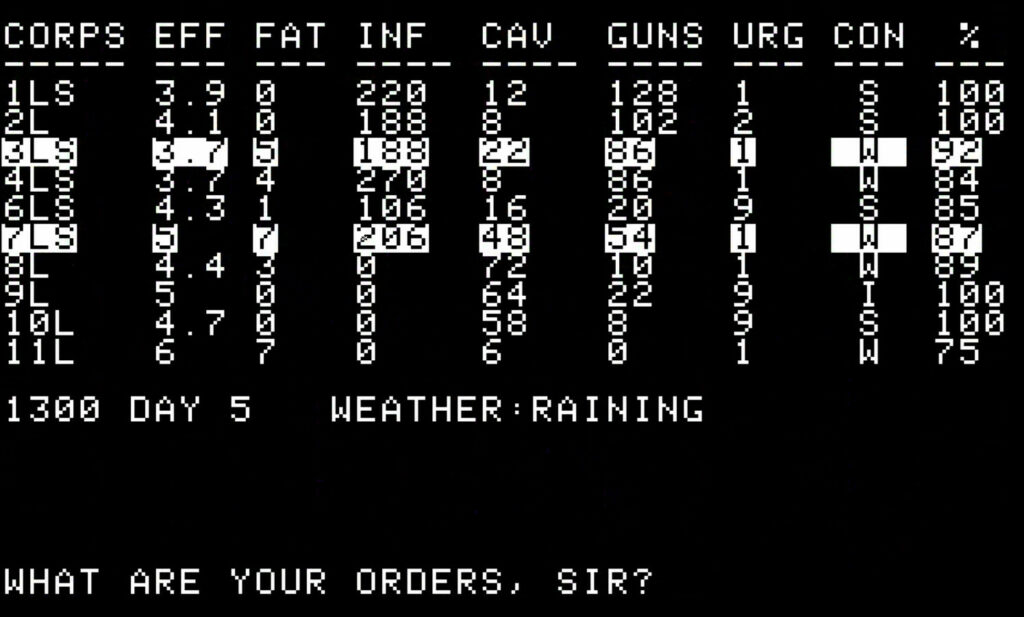
The day is mostly spent restoring some order to my men and looking for Bernadotte with Souham and MacDonald without success. Clearly, their extra-sensorial powers are not as good as Poniatowksi’s.
18th of October 1813
Heavy rain all day. Movement is difficult and combats are absolutely impossible. I use the time to rest my units more and ask Murat to help Souham and MacDonald in their “find the traitor and his Swedes” game, with no more success.
Augerau and Poniatowski still report they sense an occult Russian-speaking, or maybe German-speaking, presence around them.
19th of October 1813
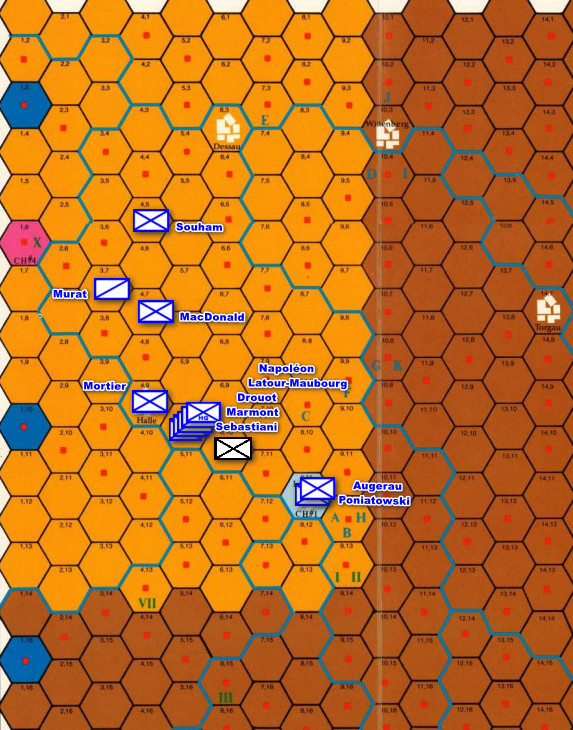
Last day. My army is ready to “rescue” Augerau and Poniatowski in Leipzig. Mortier is kept behind to protect Halle.
But just as I give my troops the Attack contact mode, I receive a nice surprise :
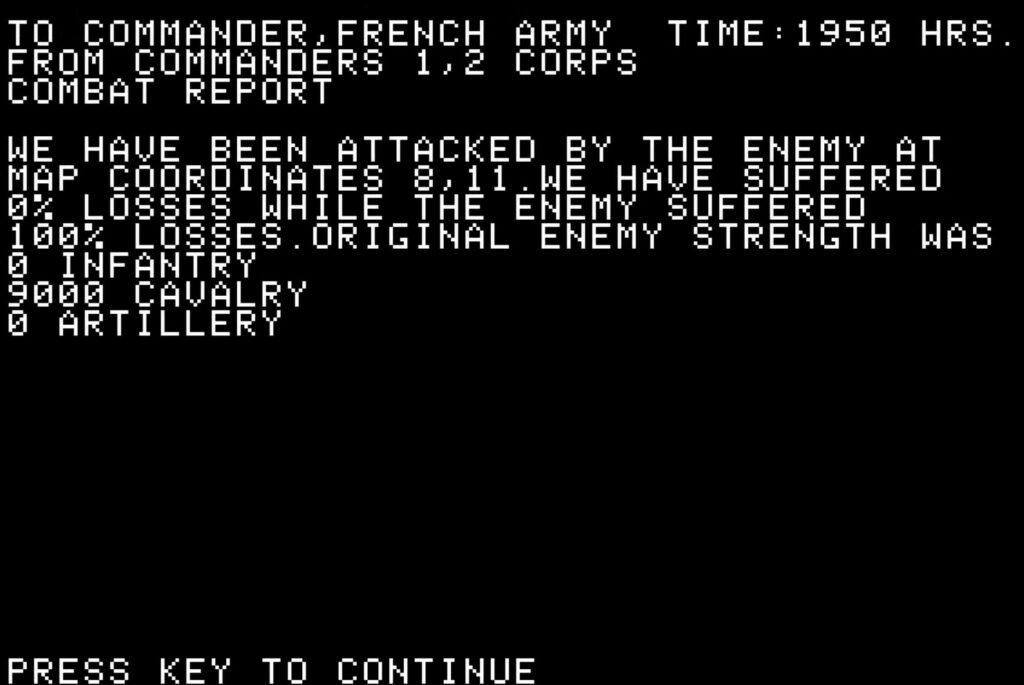
The Russian Cossack cavalry attacked Leipzig unsupported and was annihilated by Augerau and Poniatowski. Looks like I am not the only one blind in this game!
It is my turn to attack whoever is in front of me. It could be one corps or it could be nine of them, but eh, looks like I have good odds :

With Napoléon commanding and no time left, I decide to be as aggressive as possible. It pays off :
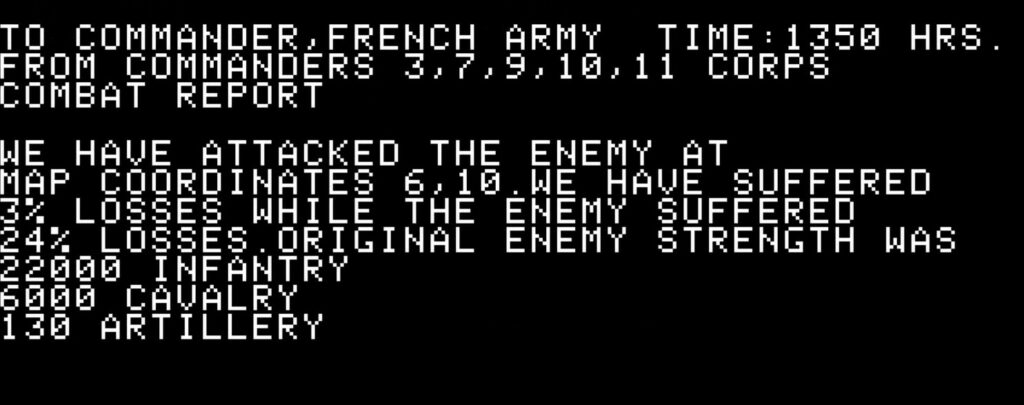
The enemies manage to retreat.
But before I can pursue them, the game ends.
This is the damage received by my army, and, last column, how many points the coalition receives for that.
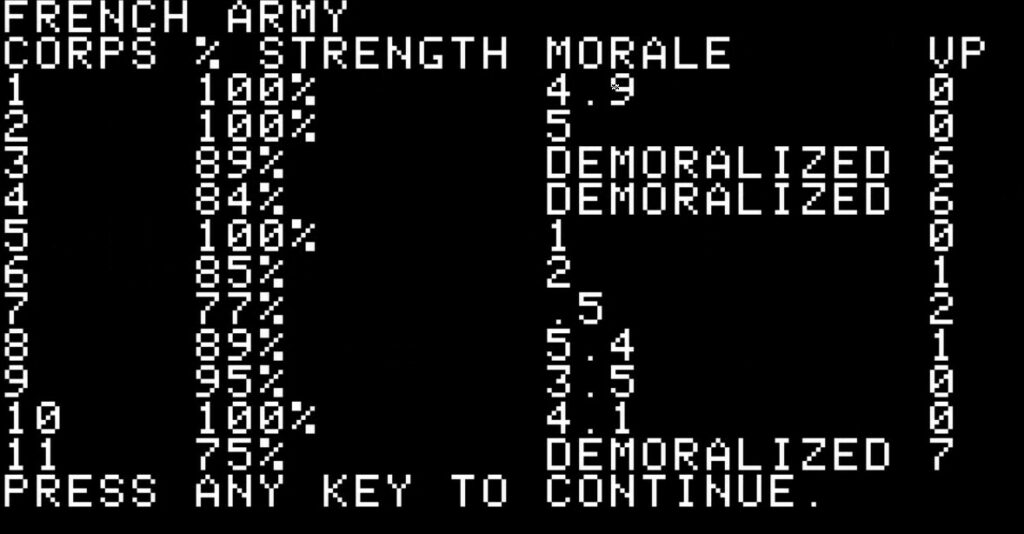
And this is the status of the coalition – with my points :
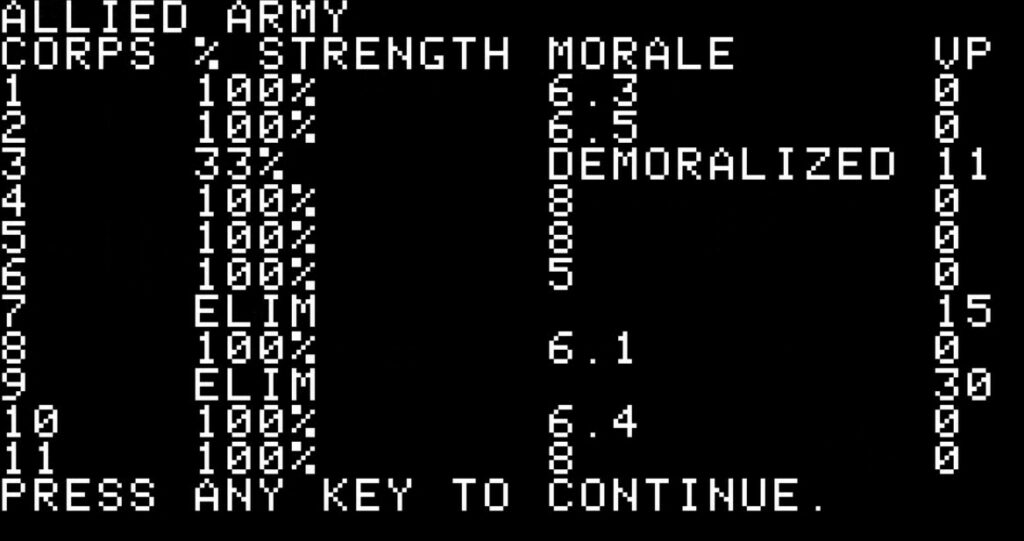
It confirms I eliminated Blucher’s Army of Silesia, and I really punished the Austrians of Meerveldt’s Corps.
Surprisingly, only 3 units can trace their communication routes West (presumably Mortier’s, MacDonald’s and Murat’s), so I only get 15 extra points on top of that.

A substantive victory, though not by much :
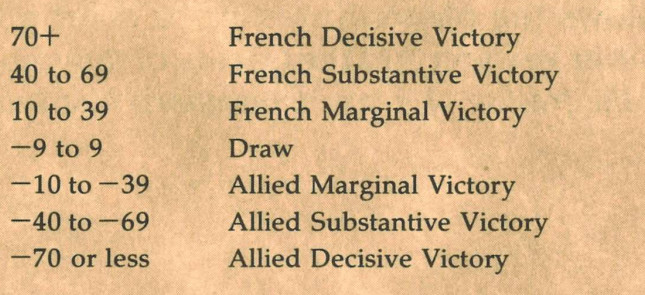
In reality, such an outcome (100 000 losses for the coalition, 17 000 for the French) would put this battle in the pantheon of Napoléon’s Greatest Victories, and possibly could have turned the course of the war. 100 000 men is more men than one side had typically fielded in any non-Leipzig Napoleonic battle up to that point (eg there were 90 000 Austro-Russians at Austerlitz). Still, neither side being able to know where the enemy was, even when in contact, stopped the battle from unfolding realistically (how do you avoid engagements you cannot win when you neither see the enemy nor know how strong it is ?), and the whole operation felt unNapoleonic. But more on this in the Rating & Review.
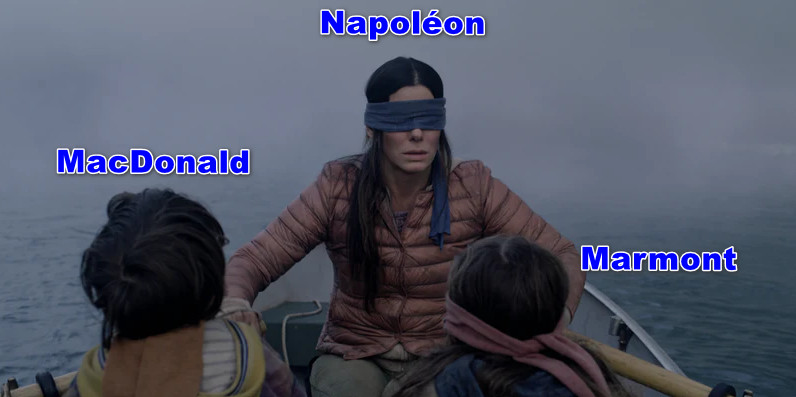
I would like to thank the “registered_user_who_never_commented_so_far” Senex for sending me the game from the USA, and actually paying the shipping cost out of his own pocket !
[Edit 29/01/2025: I found a fix for the scouting issue, and gave the game a last rodeo in January 2025 here]
6 Comments
“No Boulevard in Paris for you, MacDonald!”
Honestly, the bar for getting a boulevard named after you was pretty low considering Paris real estate at the time. All you had to do is stay on Napoleon’s good side (no changing sides when Napoleon was in exile!) and, you know, not defect to the Swedes. (https://en.wikipedia.org/wiki/Boulevards_of_the_Marshals#Exceptions)
Lines of communication, general orders but specifics left up to the commanders, Napoleon can only control when he’s personally there…wow this is amazing for a game this old. Pretty advanced stuff!
frustratingly your general will not tell you where exactly
Well did Napoleon have a godlike view of the battlefield from 10,000 feet? It’s a simulation of the battle from his point of view, and he’s down in the mud too. Or at best on a hilltop.
You got your two VP images switched.
Yes, it is really impressive in terms of ambition (I assume not many tabletop games had such a system – it would require too many players) but the result is not there. Not having a godlike view is one thing, but Augereau not telling you “the enemy is on my South” “I count between 50 000 and 100 000 of them” is another. Especially since Augereau knows the enemy is around him, given his dispatches.
It may have been the original plan to give you a little more intel: the game comes with counters for the board that say “Activity 20 000+” “Activity 50 000+”, but they are not used (and it is not just me, the CGW reviewer wondered whether those counters were there to discourage pirates !) . The game also has rules about using light cavalry to “patrol” but it never seems to make a difference.
The later “Road to Gettysburg” uses exactly the same engine, and glancing at the manual it seems to have fixed some of the most glaring issues including this one. I have a lot of expectations for it… and it should come soon (February 1982) !
The VP images are not switched, but I will edit & clarify : the first one tells me the status of my force and this way tells me how many points I give the opponent, the second one shows the status of the enemy force, and how much points I get for that.
“Augerau and Poniatowski still report they sense an occult Russian-speaking, or maybe German-speaking, presence around them.”
You could almost say this is the first Survival Horror Wargame!
Didn’t know the Oui in Ouija board stands for “Oui, mon général” and Ja stands for “Ja, mein General”, but it makes sense when you think about it 😀
Today I discover that “Ouija” actually comes from “Oui” and “Ja”. Thanks wikipedia.
Also, I just realized that I consistantly wrote AugerEau’s name incorrectly in the AAR.
That’s what happens when you are one of the 7 Napoleonic marshalls without a Boulevard in Paris named after you !